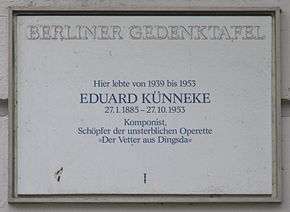Eduard Künneke
Eduard Künneke (also seen as Edward and spelled Künnecke) (27 January 1885 – 27 October 1953) was a German composer of operettas, operas and theatre music. He was born in Emmerich. His daughter was the actress and singer Evelyn Künneke.

Künneke studied musicology and literature in Berlin, and was also an advanced student of Max Bruch. He worked as a repetiteur and chorus master at a Berlin operetta theatre, the Neues Operettentheater am Schiffbauerdamm, but relinquished his post as chorus master after his opera Robins Ende (1909) was premiered in Mannheim and then received productions at 38 different German opera houses. From 1908 to 1910 he also worked as a music director for Odeon Records and conducted (without label credit) two of the earliest complete symphony recordings, the Beethoven Fifth and Sixth Symphonies with the "Grosses Odeon Streich-Orchester". Künneke later worked under Max Reinhardt and wrote incidental music for Reinhardt’s staging of Part Two of Goethe's Faust.
Künneke's graceful music is distinguished by its rhythm and striking harmonies. His best-known work is the 1921 operetta Der Vetter aus Dingsda; many of his songs are still familiar today.
In 1926, when his operetta Lady Hamilton was premiered in Breslau (now Wrocław), he formed what would become a long friendship with the conductor Franz Marszalek. Marszalek was a dedicated advocate of Künneke's music, and during his tenure at the Westdeutscher Rundfunk in Cologne (1949–65) made numerous recordings of his works (many currently unavailable) with the Cologne Radio Orchestra and the Cologne Radio Symphony Orchestra.
Selected works
- Operas
- Robins Ende, 1909
- Coeur As, 1913
- Nadja, 1931
- Walther von der Vogelweide, 1945
- Operettas
- Wenn Liebe erwacht, 1920
- Der Vetter aus Dingsda (The Cousin from Nowhere), 1921
- Die Ehe im Kreise, 1921
- Verliebte Leute, 1922
- Lady Hamilton, 1926
- Der Tenor der Herzogin, 1930
- Glückliche Reise, 1932
- Die lockende Flamme, 1933
- Die große Sünderin, 1935
- Zauberin Lola, 1937
- Hochzeit in Samarkand, 1938
- Hochzeit mit Erika, 1949
- Broadway musicals
- The Love Song, 1925
- Mayflowers, 1925
- Orchestral
- Piano Concerto No. 1 in A flat major, op. 36; Recorded on Koch Schwann CD 3-1372-2 (1997) with Tiny Wirtz, piano; Rundfunkorchester Des Sudwestfunks led by Wlodzimierz Kamirski
- Jazz Suite for jazz band and orchestra, 1929
Film
- Love Songs (1930)
- The Black Hussar (1932)
- Frederica (1932)
- The Page from the Dalmasse Hotel (1933)
- Homecoming to Happiness (1933)
- Three Bluejackets and a Blonde (1933)
- The Cousin from Nowhere (1934)
- When the Young Wine Blossoms (1943)
- The Cousin from Nowhere (1953)
References
This article is a translation of the article on Künneke in the German-language Wikipedia.